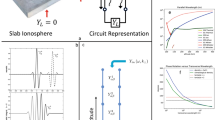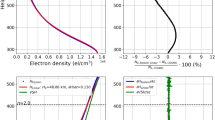Abstract
RECENTLY, Cowling and Borger1 have put forward theoretical reasons why the electric conductivity of the ionospheric D-region may be considerably less than that of the combined E–F-regions. On the further postulate that tidal motions increase with height in the ionosphere, they conclude that a recent deduction2 concerning the origin of the solar and lunar magnetic variations is improbable.
This is a preview of subscription content, access via your institution
Access options
Subscribe to this journal
Receive 51 print issues and online access
$199.00 per year
only $3.90 per issue
Buy this article
- Purchase on Springer Link
- Instant access to full article PDF
Prices may be subject to local taxes which are calculated during checkout
Similar content being viewed by others
References
Cowling and Borger, Nature, 161, 515 (1948).
Martyn, Nature, 160, 535 (1947).
Martyn, Proc. Roy. Soc. (in the press).
Martyn, Proc. Roy. Soc. (in the press).
McNish, Terr. Mag. and Atmos. Elect., 42, 109 (1937).
Cowling, Mon. Not. Roy. Ast. Soc., 93, 90 (1933).
Author information
Authors and Affiliations
Rights and permissions
About this article
Cite this article
MARTYN, D. Electric Conductivity of the Ionospheric D-Region. Nature 162, 142–143 (1948). https://doi.org/10.1038/162142a0
Issue Date:
DOI: https://doi.org/10.1038/162142a0
This article is cited by
-
The equatorial electrojet (EEJ) current deduced from CHAMP satellite and ground magnetic measurements in West Africa
Arabian Journal of Geosciences (2017)
-
The electrical conductivity of the ionosphere: A review
Il Nuovo Cimento (1956)
-
Dynamo Currents and Conductivities in the Earth's Upper Atmosphere
Nature (1952)
-
Conductivity of the Ionosphere
Nature (1952)
Comments
By submitting a comment you agree to abide by our Terms and Community Guidelines. If you find something abusive or that does not comply with our terms or guidelines please flag it as inappropriate.



